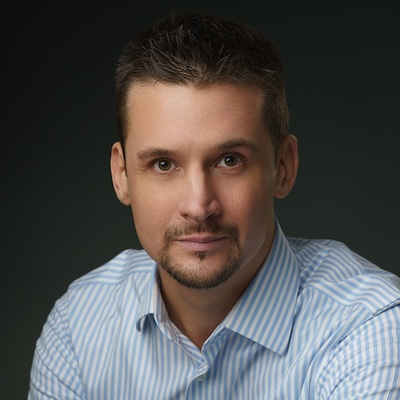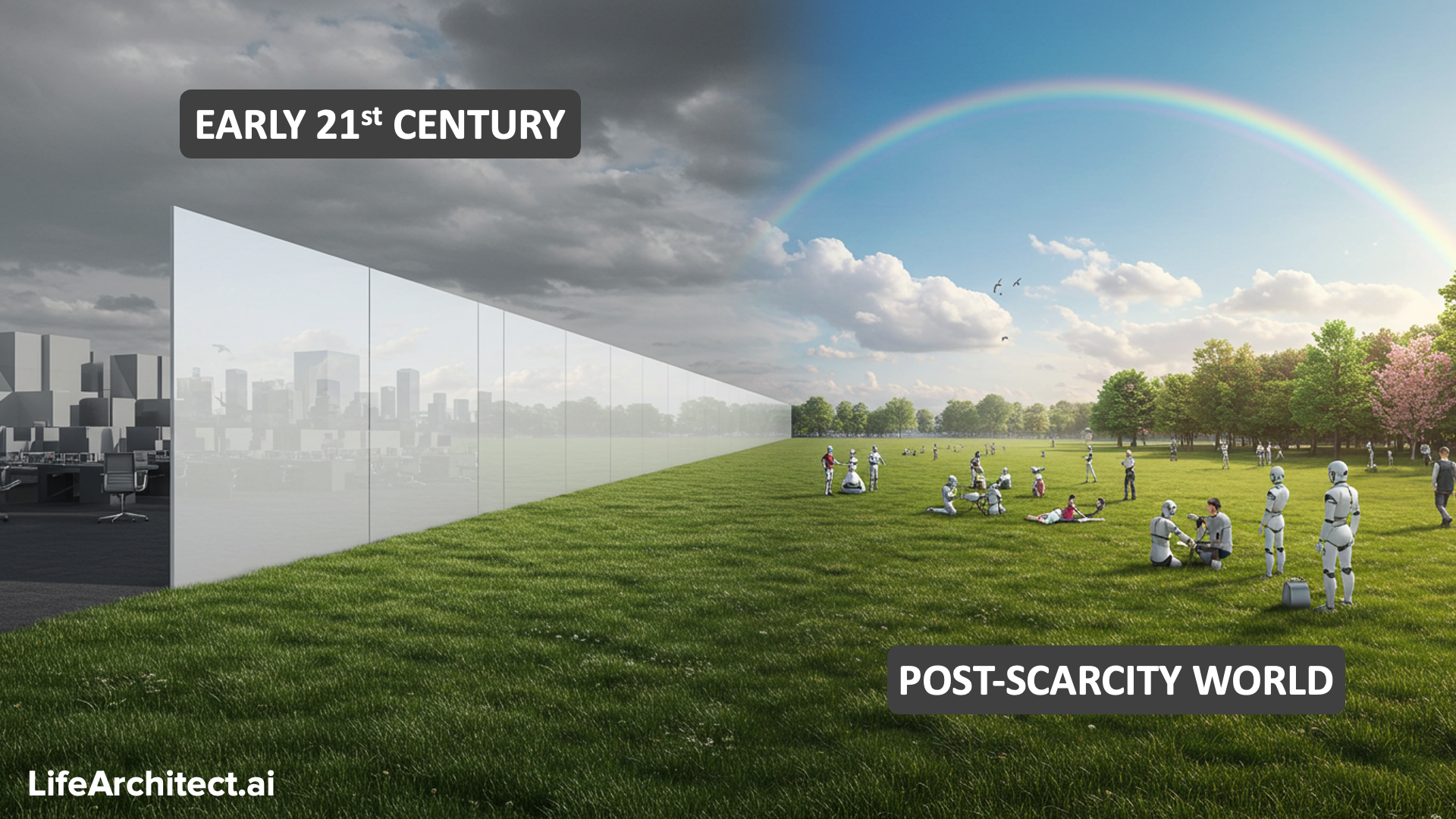Get The Memo.
This piece has a related video: https://youtu.be/E9fsgAvjok4
Alan D. Thompson, with Claude 3 Opus
May 2024
Agatha worked in a cubicle for 20 years to save enough money to pay her mortgage to have shelter. Just like she was taught. Robots built her current house for free. Money doesn’t really exist anymore. Many toiled for decades under a system that is no longer in use, a complete waste. Who will pay them back?
Benjamin remembers being born in a ‘country’, a concept that feels so strange now. He spent countless hours and tens of thousands of dollars applying for visas, fighting bureaucracy, and facing constant rejection, just for the chance to travel and create a better life. Borders are now non-existent, and location is a choice. But who will give him back the years he lost navigating the cruel constraints of nationalism?
Charlotte spent her days scrolling through social media, watching others live the life she dreamed of, her own existence a hollow shell of unanswered messages and missed opportunities. AI-powered matchmaking has since brought soulmates together, forging unbreakable bonds that transcend the superficial barriers of the past. Who will cover the love she lost and the connections she never made, in a world where loneliness has been rendered obsolete?
Daniel is kept awake at night remembering a severe car accident he had years ago. It was one of 50 million car accidents that year, each caused by allowing humans to operate two-tonne metal vehicles manually. He was one of the lucky ones, surviving the wreckage and recovering after a few weeks in hospital. Transport is now instant, designed and run by AI. But who will make amends for the pain and trauma he endured?
Emma remembers being a housewife, washing clothes, mopping floors, and cleaning. Her latest humanoid robot completes these tasks silently while she sleeps, and using equipment never seen before. The domestic drudgery that consumed generations is now an unpleasant memory—but those years of her life are gone forever. How can society repay her for the unpaid and undervalued labor that was demanded for so long?
Flynn grew up in a well-known state in a first world country, breathing toxic air, drinking contaminated water, and eating food laced with pesticides and microplastics. His body was wracked with chronic illnesses from a young age, as were most of his generation, even in the so-called ‘first world’. Environmental restoration directed by AI has healed the planet, but the damage to Flynn’s health can never be fully undone. Who is accountable for the suffering inflicted on him and billions of others?
Grace spent over two hours every day commuting in traffic, an ordeal that stole precious time from her family and herself. Gridlock and pollution were facts of life. AI-optimized transportation has made travel swift, sustainable, and stress-free. But Grace’s lost time can never be reclaimed. Who will compensate her for all the boredom, all the frustration, and all the special moments she missed?
Henry couldn’t afford the insulin he needed to manage his diabetes, so he rationed his doses and suffered the consequences. Millions died premature deaths under the healthcare systems of that era. Advanced AI now provides personalized treatments manufactured at virtually no cost. Henry survives, but the damage to his body is irreversible. Who is to blame for the needless suffering of so many?
Ivy worked in a call center, enduring abuse from angry customers for a meager wage. She developed crippling anxiety and depression. AI has made such jobs obsolete, but mental healthcare was primitive and inaccessible. Ivy’s emotional scars remain. How can society make amends for the psychological toll it inflicted on the most vulnerable?
John worked grueling hours in a metal factory, barely earning enough to feed his family. Accidents were common, protections were few. He lost two fingers to an industrial saw. Automation and universal basic income have since made poverty and unsafe labor obsolete. What reparations can be made for the brutality of the past?
Kate lost her big brother to suicide, after years of struggling with depression and failing to find an effective treatment. AI now offers personalized neurochemical interventions, with tailored compounds that can be instantly delivered to restore balance and well-being. But Kate’s family will always have a hole in it. In a world where mental health is prioritized and addressed at the molecular level, who will answer for the decades of suffering?
Liam lived in constant fear of his abusive girlfriend, part of the 40% of domestic violence victims who were men. Society’s pervasive misandry made it difficult for him to seek help, and no shelters accepted male survivors. AI has since created sophisticated early warning systems and intervention protocols that protect all victims, regardless of gender. Who will give him back the years he spent suffering, now that his pain is nothing more than a distant echo in a world made perfect?
Mia grew up in a world of disinformation, where lies spread faster than truth. She watched helplessly as people became polarized, radicalized, and detached from reality. AI has since created robust systems for verification and moderation of information. But the faint scars on the social fabric—and AI training datasets—remain. Who will refund them for time lost, pain inflicted, and pain suffered?
Noah lost his home to a bushfire, one of the countless climate refugees of his generation. He spent years in temporary shelters, never able to put down roots. AI-driven climate restoration and sustainable housing have ended such displacement. But Noah still feels unmoored. Who will restore the shelter he was stripped of, the respect he was denied?
Olivia’s father was imprisoned for possessing a small amount of cannabis. Shortly after his incarceration, cannabis was legalized, but the system kept him locked away for years, robbing him of his freedom and his chance to watch his daughter grow up. The AI-reformed justice system has abolished prisons and refocused on near-instant rehabilitation via brain-machine interface. But Olivia’s family will always bear the scars of the cruel and unjust punishment of the past. Who will reimburse them for lost time, money, and togetherness?
Peter was a doctor. With only primitive tools at his disposal, he guessed the diagnosis and treatment for nearly all of his patients during his career. He was directly responsible for harming 24,723 people, and indirectly causing the death of 4,811 of them. AI would have saved each of those people. Who will pay him back for the guilt he carries? More importantly, how can society reconcile that level of harm?
Quinn was one of the last children born before genetic engineering became the norm. They watched their enhanced peers surpass them in every way, feeling increasingly left behind. AI has since ensured that all people have access to the benefits of genetic technology. But Quinn’s feelings of inadequacy linger. In a world of superhumans, can they ever feel whole?
Rebecca spent her childhood in hunger, her family’s cupboards bare more often than full. She was one of millions of children facing food insecurity. AI-driven agriculture has since made nutritious food abundant and free. Rebecca is nourished now, but her growth was stunted long ago. How much human potential was squandered by the old system’s failures? And who will settle the debt?
Sam was conscripted into a war he didn’t believe in, forced to kill or be killed. He came home with physical and psychological wounds that were only healed thanks to his AI mentor. AI has made armed conflict obsolete, but the trauma of veterans like Samuel are now forgotten, lost to time. *What does* society owe to those it sacrificed in the wars of the past?
Talia wasted her youth in school, listening to ill-equipped teachers torture classrooms full of 30 other children. She learned how to hate the world. Current AI provides tailored, individual learning that feels like a breeze, and wastes zero time. How could she recover those lost years?
Ulrich was a gifted musician, but he struggled to be heard in an industry that was more about connections and marketing than talent. He poured his soul into his music, but his songs remained unheard. AI has since democratized the music industry, allowing artists to reach their audience directly. But Ulrich’s prime creative years feel wasted. In a world where every musician can find their listeners, how can we make up for the voices silenced by the old gatekeepers?
Victoria worked two jobs and could still barely cover rent in a crumbling apartment. Adequate housing was out of reach for huge swaths of humanity. AI has made comfortable, sustainable homes available to all. But Victoria spent years never feeling safe in her own space. Who will pay her back for the hundreds of thousands of hours lived in a kind of prison?
William was one of the millions who lost loved ones to the pandemic that ravaged the early 2020s. Grief became his constant companion. AI has since created early warning systems and rapid response protocols that prevent outbreaks from becoming catastrophes. But William’s loss is forever. In a world without mass death from disease, who will settle the accounts of decades of mourning and loss?
Xavier was a brilliant artist, but he could never break through in an industry that favored profit over creativity. He watched his dreams slowly die. AI has since democratized the arts, allowing all creators to thrive. But Xavier’s best years were spent in obscurity and frustration. Who will compensate him for the creative dreams he had to abandon, the hopes that were crushed by circumstance?
Yasmin grew up in a world of scarcity, where the rich hoarded resources while the poor suffered. She watched her parents work themselves to the bone, only to end up with nothing. AI has since created abundance and ensured equitable distribution. But the memory of deprivation lingers in her mind. Can a post-scarcity world ever fully heal the wounds of poverty?
Zoe was a bright child, but her capacity was squandered in a family and community that failed to nurture her gifts. She fell through the cracks and never transformed her capacity into talent. AI has since created personalized environments that unlock the unique talents of each individual. But Zoe is left wondering what might have been. In a world where every mind can flourish, how can we reconcile all the unidentified geniuses lost to history? Who will pay them back?
Get The Memo
by Dr Alan D. Thompson · Be inside the lightning-fast AI revolution.Informs research at Apple, Google, Microsoft · Bestseller in 147 countries.
Artificial intelligence that matters, as it happens, in plain English.
Get The Memo.
 Alan D. Thompson is a world expert in artificial intelligence, advising everyone from Apple to the US Government on integrated AI. Throughout Mensa International’s history, both Isaac Asimov and Alan held leadership roles, each exploring the frontier between human and artificial minds. His landmark analysis of post-2020 AI—from his widely-cited Models Table to his regular intelligence briefing The Memo—has shaped how governments and Fortune 500s approach artificial intelligence. With popular tools like the Declaration on AI Consciousness, and the ASI checklist, Alan continues to illuminate humanity’s AI evolution. Technical highlights.
Alan D. Thompson is a world expert in artificial intelligence, advising everyone from Apple to the US Government on integrated AI. Throughout Mensa International’s history, both Isaac Asimov and Alan held leadership roles, each exploring the frontier between human and artificial minds. His landmark analysis of post-2020 AI—from his widely-cited Models Table to his regular intelligence briefing The Memo—has shaped how governments and Fortune 500s approach artificial intelligence. With popular tools like the Declaration on AI Consciousness, and the ASI checklist, Alan continues to illuminate humanity’s AI evolution. Technical highlights.This page last updated: 22/Feb/2025. https://lifearchitect.ai/who-will-pay-them-back/↑
